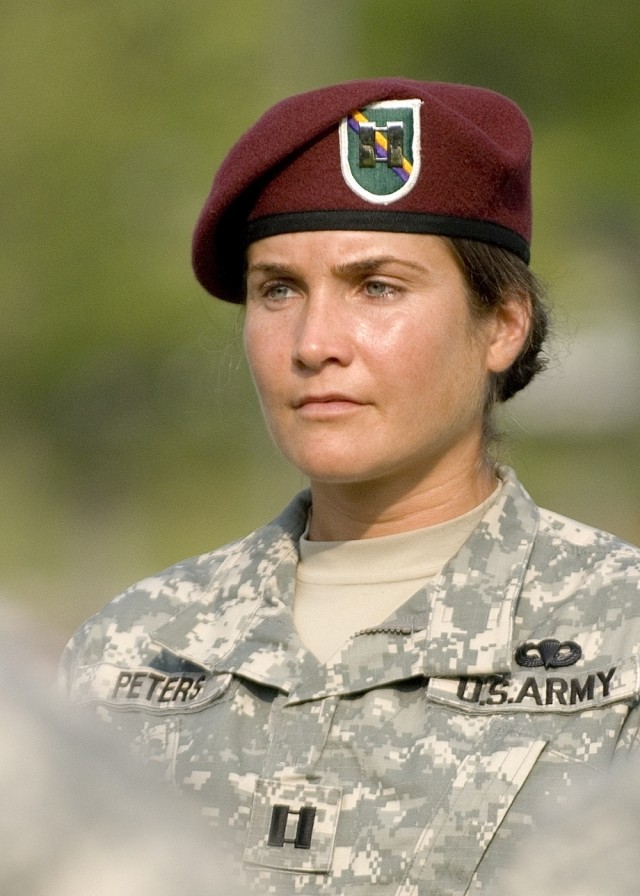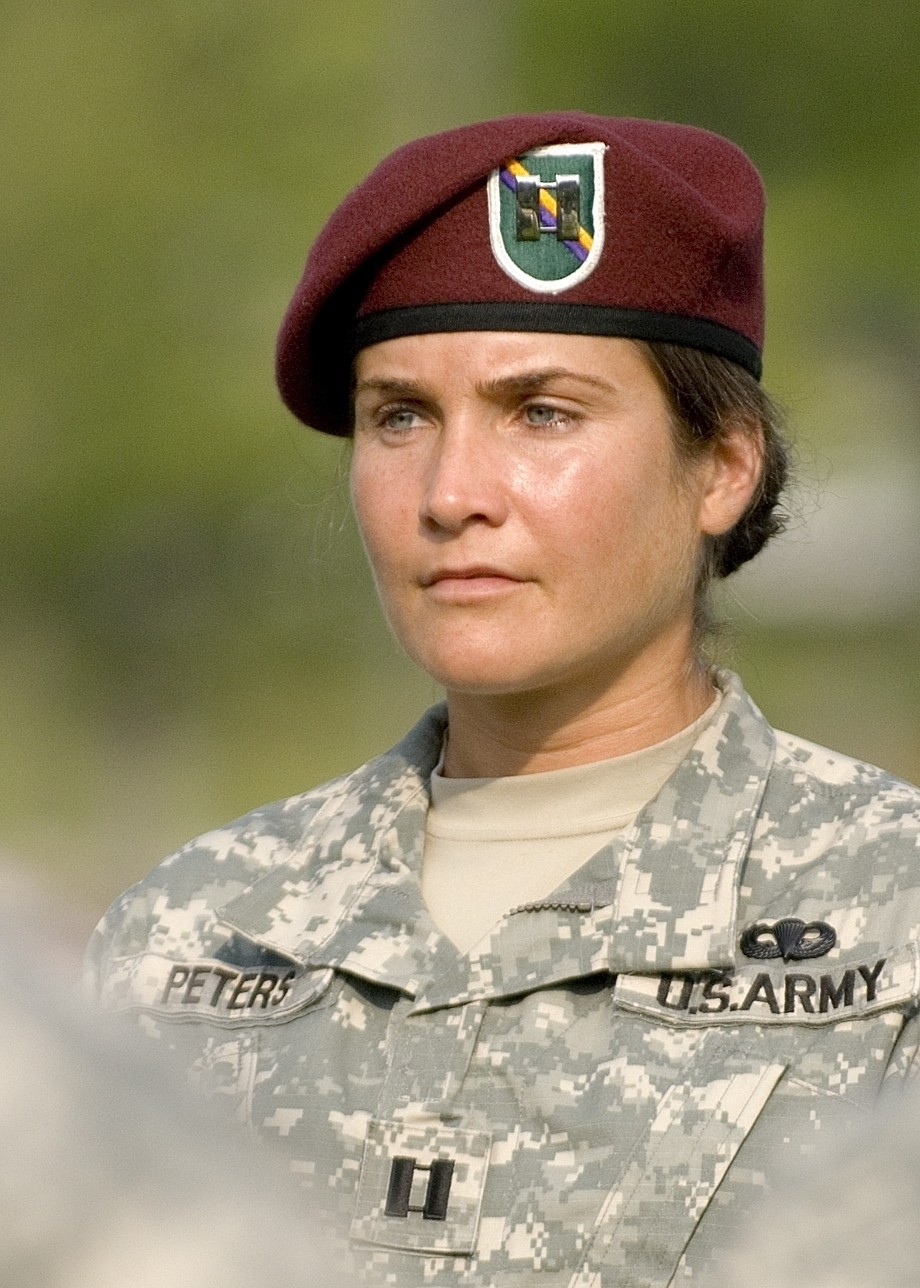
FORT BRAGG, N.C. (USACAPOC(A) News Service, Aug. 7, 2008) - When Capt. Laura Peters, a 31-year-old Army Reserve Civil Affairs Soldier, began her deployment to Iraq in March 2007, she never imagined she would be one of few military service members to receive the Department of State's prestigious Superior Honor Award in an award ceremony at Fort Bragg a year and a half later.
"This has been an honor to work with the Civil Affairs community, the Department of State," said Peters after receiving her award before fellow Soldiers of her assigned unit, the 1st Training Brigade. "Honestly, I have a huge debt of gratitude from the amazing experiences that I've grown from as a person and a leader."
Like many Army Reserve Soldiers who answered their nation's call to duty, Peters duly departed her comfortable civilian lifestyle, waved goodbye to her parents and promised her Philadelphia-based high school biology and chemistry students that she would write - on the Internet of course!
She was assigned to a brigade provincial reconstruction team in the Salah Ad Din Province, Iraq, where her work contributed to the bonds of trust and cooperation that enabled the PRT to work effectively with the Provincial Government, the Sheiks' Council, the Provincial Council and the U.S. Army leadership in Multi-National Division-North, according to her award citation.
"She has joined our Economic Team as a full-fledged participant at her own initiative," said Steven R. Buckler, the former Salah Ad Din PRT leader and now State Department Executive Assistant to the Assistant Secretary for Administration or Minister-Counselor - a two-star general equivalent.
"Interpersonal relationships are vital when dealing with Iraqis," wrote Buckler. "Capt. Peters has developed a close personal and professional rapport with both the Governor and Deputy Governor that has directly benefited the PRT's credibility with those top provincial officials. She is graced with an extroverted personality that combined with her intellectual acuity have won the confidence and respect of those leaders. Senior Iraqi officials confide in her and, in turn, I am able to entrust her with sensitive issues to relay to them when I cannot travel. As a military officer, she has much more freedom of movement in this war zone than me so she is my "force multiplier" in maintaining rapport with Provincial leaders in hugely difficult circumstances. The payoff for her relationship with the Provincial leadership is real."
PRTs are a relatively new concept in Iraq, but not new to reconstruction. The PRT model has been used in Afghanistan successfully for more than six years now, underscoring the success of interagency coordination.
PRTs exist to build Iraqi capacity and accelerate the transition to Iraqi self reliance. The front-line operatives in the campaign to stabilize Iraq are the American and Coalition members who comprise the Provincial Reconstruction Teams, according to the DOS's Web page.
These are relatively small operational units comprised not just of diplomats, but military officers, development policy experts (from the U.S. Agency for International Development, the Department of Agriculture, and the Department of Justice), and other specialists (in fields such as rule of law, engineering and oil industry operations) who work closely with Iraqi provincial leaders and the Iraqi communities that they serve. While PRTs dispense money for reconstruction projects, the strategic purpose of these civil-military field teams is both political and economic.
By building provincial governments' ability to deliver essential services and other key development projects to local Iraqis, PRTs help to extend the reach of the Iraqi government to all corners of the country and help build the stability necessary to complete the transition to full-Iraqi control.
"Peters' proactive management and coordination of military movements and contacts with Iraqi officials, her development of close, personal relationships with the provincial governor, deputy governor and the influential Sheiks, her intellectual skills and intellectual courage demonstrated in Iraq are indicative of the talented men and women who serve abroad as trained Civil Affairs operators in support of interagency cooperation and of U.S. national objectives abroad," said Buckler.
"This award is very significant for Capt. Peters and our community," said Maj. Gen. David A. Morris, ceremony officiator and commander of the U.S. Army Civil Affairs and Psychological Operations Command (Airborne). "It's not every day the Department of State goes through such a significant level of work and documentation to recognize someone outside of their own community. Capt. Peters is a shining example of what CA is all about. Thanks to young Soldiers, officers and noncommissioned officers, we have excellent reputation not only with the rest of the military but the interagency community, which is very significant because the kind of work we have to do every day is very heavily dependent upon interagency cooperation. Congratulations Captain Peters."
Peters is among the few USACAPOC(A) personnel to have the SHA.
Peters is currently serving as the commander of the Headquarters Company of the 1st Training Brigade, a subordinate unit of the U.S. Army Civil Affairs and Psychological Operations Command (Airborne) headquartered at Fort Bragg, N.C.
The U.S. Army Civil Affairs and Psychological Operations Command (Airborne), stationed at Fort Bragg, N.C.; is the headquarters of all Army Reserve Civil Affairs and Psychological Operations forces.
Aca,!Ac USACAPOC(A) is a multi-component command composed of nearly 10,000 Soldiers in 69 units across 27 states.
Aca,!Ac USACAPOC(A)'s forces are deployed to over 20 countries at any one given time.
Aca,!Ac The command retains 5 percent of the Army Reserve's CA and PSYOP force, but carries 20 percent of the Army Reserve's deployments.
Aca,!Ac USACAPOC(A) is home to 94 percent of the Department of Defense's CA capability and 71 percent of the DoD's PSYOP capability.
Related Links:
Civil Affairs Soldier Earns Department of State Superior Honor Award

Social Sharing